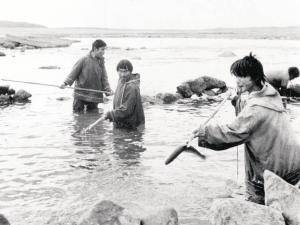
In the snow packed regions of Alaska, individuals living there have been labeled as Eskimos, an Algonquian word meaning “raw meat eaters.” While the term may seem acceptable to mainstream American, the subtle mention of the word ‘Eskimo’ conjures images of racial indignation for most Alaskans.
Alaskans classify themselves in distinct groups Athabascan, Aleut, Alutiq, Eyak, Tlingit, Haida, Tsimshian,Yup'ik, Cup'ik and Inupiaq. The recipe for Akutaq, dubbed Eskimo ice cream, contradicts average commercial imagery. Not at all similar to a chocolaty vanilla treat, the recipe contains portions of reindeer fat, seal oil and salmon berries.
Patricia Cochran, International chairperson of the Inuit Circumpolar Council (ICC), is Inupiaq and often deals with issues of indigenous identity. Cochran doesn’t acknowledge Eskimo as a universal descriptor of her heritage. Doing so, she says, would constitute a denial of her heritage.
“I don’t say I’m Eskimo because that’s like saying I’m white,” she says. “The Canadian Inuit population does think the word ‘Eskimo’ is a derogatory term.” She says her group uses “Inuit” as an all-encompassing word to describe the people of the Arctic area who share common interests.
For Peter Irniq, an Inuit cultural teacher and artist, the pains associated with the term ‘Eskimo’ run much deeper.
“There was a lot of racism directed at the Eskimo when the Qablunaat (white men) first came to our communities,” Irniq recalls. “ 'We have a whole bunch of sons-of-bitches of Eskimos in Repulse Bay, they don't know how to hunt and trap’ was what the Hudson's Bay manager used to say to me, after I had attended residential school in Chesterfield Inlet.' ‘You Eskimos will never amount to anything,’" was another favorite line.
“When I was first sent south to work in Kitchener and then Ottawa by the Canadian government, some hotels and restaurants did not allow us to enter because we were Eskimos,” he continued. “We were laughed at because, ‘you Eskimo rub noses with your women, live in igloos or ice houses.’ It was very embarrassing.”
While ‘Eskimo’ represents a past filled with turmoil for many Inuits, others like Renee Douglas have chosen to focus more on the customs and traditions they hold dear.
“I’m proud to be Inupiaq,” says Douglas, Inupiaq language and cultural specialist for the NANA Regional Corporation.
“Maybe we should turn the tables around and say we are Inupiaq and not Eskimo,” says Douglas. “We are more than eaters of raw meat. To me, we are one of the kindest people you will find on the face of this earth.”
She says their pride comes from their ability to sustain themselves using land and water resources. “I just got off the ice yesterday,” she says, noting that she caught three big white fish and is anxious about the upcoming seal season. “Within our area we’re still pretty strong in our culture. We still live off the land. We’re born Inupiaq and we’ll always be Inupiaq.”
Recipe for Akutaq (Eskimo Ice Cream)
Ingredients:
1 lb. dried reindeer fat (grated or shredded)
1 cup seal oil
1 pint salmonberries
3 cups sugar
Preparation:
Add water to reindeer fat and seal oil till frothy
Add berries and sugar
